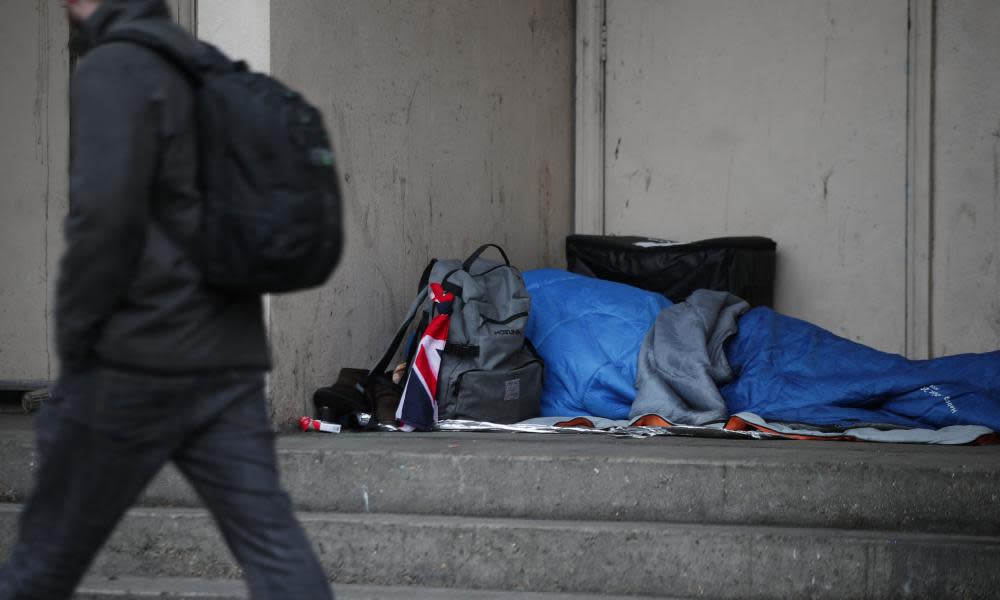Want to know why rough sleeping has risen, Heather Wheeler? Cuts

The homelessness minister Heather Wheeler has admitted that she “doesn’t know” why rough sleeping has risen so much in the past seven years. As the chief executive of the YMCA in Birmingham, I can tell her: it’s because years of cuts to services for vulnerable people are adding up.
Let’s start with housing benefit cuts for EU migrants. In 2015, the government changed the law so EU citizens would have to show they’d been in employment for at least six months before they were allowed to claim benefits. This change wasn’t a problem for most EU citizens, who either don’t need housing benefit, or claim it for short periods between paid employment. But there were some who paid their rent with housing benefit. It also affected EU workers in the informal economy doing cash-in-hand work that makes it hard to demonstrate a history of legitimate employment. Such people were in the country wholly legally and so couldn’t be deported, but were effectively rendered destitute. The street was the only option.
Then there has been the cuts to the supporting people funding, which paid for services like support workers who could help the most vulnerable to sustain their tenancies, for example by signposting them to drug services, and helping them stick to their treatment.
In 2003 we were funded to employ one support worker for every eight residents. Today we have one worker for every 18
Rough sleeping reduced between 2003, when this funding was introduced, and 2011. It was the first time such services were properly and securely funded and it was phenomenally successful at getting – and keeping – people off the streets. But in 2009, the ringfence that protected it was removed. Wide-scale council cuts meant the grant has been used to plug funding gaps in other services with a higher political priority instead of being used to protect people from becoming homeless.
Furthermore, while the government is right to say that it has not cut the number of bed spaces available to the homeless, that is not the whole story. Charities that have lost funding no longer have sufficient funding to offer support to the most vulnerable – their services are just too stretched. In 2003, we were funded to employ one support worker for every eight residents in our hostel in Northfield. Today, we have one worker for every 18 residents. That means we are unable to take on people with more complex problems like serious drug use or mental health problems, because it’s not safe for us to do so. The bed spaces are now available to different people, and people at a higher risk have nowhere to go but the street.
And of course, the other organisations that support rough sleepers, including mental health services, police and probation services, have also been cut. In Birmingham, our teams used to include drug treatment workers, mental health workers and the police, as well as homelessness workers. Now the specialists have disappeared and the housing workers have to go out on their own. They can’t diagnose problems or prescribe medication so can offer no reassurance to hostels that it’s safe to house people. Hostels are far less likely to accept referrals because they know that rough sleepers will have to take their place at the back of a long queue before they are properly assessed and treated.
Wheeler’s commitment to building more affordable homes is to be welcomed, but she shouldn’t be under any illusions that it will help solve the rough sleeping crisis.
People don’t sleep rough because of a lack of housing – they might sleep on friends’ floors or in overcrowded accommodation, but they won’t usually end up on the street for any length of time. They sleep rough because of the lack of necessary support services that enable them to access the accommodation that is available and to sustain a tenancy.
Alan Fraser is chief executive of YMCA Birmingham.
The headline on this article was changed on Wed 21 March to reflect the fact that the cuts referred to were made by several different governments.
Sign up for your free Guardian Housing network newsletter with comment and sector views sent direct to you on the last Friday of the month. Follow us:@GuardianHousing
Looking for a housing job, or need to recruit housing staff? Take a look at Guardian Jobs

 Yahoo News
Yahoo News 
